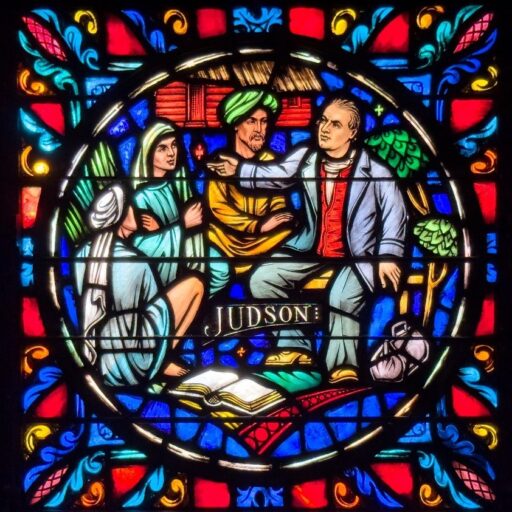1855-1930
Joseph Judson Taylor
Baptist Pastor/Pacifist VA/GA
Joseph Judson Taylor was born May 1, 1855, in Henry County, Virginia, to Daniel Gray Taylor and Martha King Taylor.[1] J. J. was named for his material grandfather and missionary Adoniram Judson who had died five years before J. J. was born. He attended Richmond College (now University of Richmond) and graduated as valedictorian in 1880. During his career, he pastored 7 churches and even served as president of Georgetown College in Kentucky, 1903-1907. Theologically conservative, Taylor affirmed a literal interpretation of the Bible and opposed both evolution and Harry Emerson Fosdick.[2]
But Joseph Judson Taylor stood out as the leading Baptist pacifist at the turn of the twentieth century. John Finley tells the story well.

Baptist pacifists have often been an endangered species. No better example can be found than that of Joseph Judson Taylor, pastor of First Baptist Church, Savannah, Ga., as America prepared to enter World War I.
Taylor had moved to Savannah in 1915 from the pastorate of First Baptist Church, Knoxville, Tenn. The pulpit committee glowingly described the new minister in its recommendation to the congregation: “He stands among the foremost of our preachers in a Southern pulpit. In doctrine he is sound, clear, and conservative. As a man he is scholarly, yet genial; aggressive, but prudent; commanding the respect of the world as he wins the hearts of all.”
The committee did not state, but should have known after three days of discussion in Knoxville, that Taylor was an avowed pacifist. As did the earliest Christians, Taylor took a literalist position on the commandment, “Thou shalt not kill,” and it determined his attitudes toward war and peace. Moreover, he had published his pacifist views earlier in his ministerial career. The first two years in Savannah were relatively uneventful, but the calm was soon to end.
The 1917 Southern Baptist Convention met in New Orleans shortly after Congress had declared war. Taylor attended the convention as a registered messenger and cast the lone vote against the report of the Committee on the World Crisis. He observed that the convention had “too much of Caesar and too little of Christ.” The following day, he offered three articles in a counter-resolution on peace which was overwhelmingly defeated.
Never one to hide his pacifist leanings, Taylor returned to Savannah and preached a sermon in which he reported on the SBC meeting and explained his views on war and peace. Controversy erupted as the pastor’s pacifism sharply contrasted with the congregation’s strong support of the war effort.
At the deacons’ meeting on Nov. 3, a motion was approved which declared: “… he tender his resignation to the church, believing that by so doing he will save both himself and the church further embarrassment and will strengthen the work of the church in this community.”
Two days later, Taylor responded to the deacons by stating: “I in no wise admit that a pacifist is not a patriot. As our country is in war, I am absolutely loyal to the country’s interest in every fibre of my being; and I am confident that the pacifist will be more popular later than he is today.” Taylor resigned immediately, and the deacons took out a loan with the Savannah Bank and Trust Company in order to pay him three months severance.
Following the horrors of World War I, Taylor’s pacifism was viewed altogether differently. At the 1922 SBC meeting in Jacksonville, Fla., he was elected a vice president of the convention. The following year, he introduced an anti-war resolution at the meeting in Kansas City, and messengers were so taken by his words that they approved the resolution. Joseph Judson Taylor also influenced the article on “Peace and War” which was incorporated into the 1925 Baptist Faith and Message statement.[3]
The 1925 Baptist Faith and Message, section 19, generally attributed to Joseph Judson Taylor, reads like this:
XIX. Peace and War. It is the duty of Christians to seek peace with all men on principles of righteousness. In accordance with the spirit and teachings of Christ they should do all in their power to put an end to war.
The true remedy for the war spirit is the pure gospel of our Lord. The supreme need of the world is the acceptance of his teachings in all the affairs of men and nations, and the practical application of his law of love.
We urge Christian people throughout the world to pray for the reign of the Prince of Peace, and to oppose everything likely to provoke war.[4]
The current 2000 edition of the Baptist Faith and Message includes this statement on Peace and War in section 16 but omits the last phrase in opposition to “everything likely to provoke war.”
+++++++++++++++
[1] This couple had one son named for Adoniram Judson, Jr., (Thomas Judson Taylor, entry 1821-1890) and two grandchildren named for Adoniram Judson, Jr., (Joseph Judson Taylor, entry 1855-1930 and Eugene Judson Taylor, entry 1879-1881).
[2] Laurence Vance, “Joseph Judson Taylor, Man of Peace,” Libertarian Christian Institute, March 18, 2015.
[3] John Finley, “Joseph Judson Taylor: Baptist Pacifist in a Time of War,” Good Faith Media, May 1, 2022.
[4] https://www.utm.edu/staff/caldwell/bfm/1925/19.html
